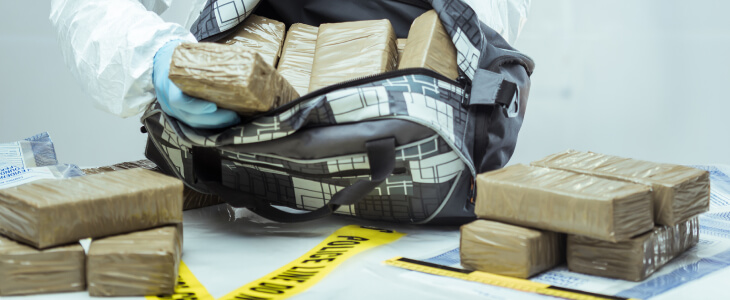Rhode Island has a comprehensive set of laws regulating controlled substances, including drug manufacture, distribution, and possession. The state’s drug laws are intended to curb the illegal drug trade and minimize drug abuse and its harmful effects on society. The legal consequences of drug crimes in Rhode Island vary widely depending on the type and amount of drug involved, the nature of the offense, and the offender’s criminal history. Here is a detailed discussion of the various drug crimes and their legal consequences:
- Possession of Controlled Substances: Possession of small amounts of controlled substances for personal use is considered a misdemeanor or felony, depending on the substance. Penalties can include fines, imprisonment, or both. For example, possession of a Schedule I substance (heroin, LSD) can lead to more severe penalties than possession of a Schedule IV substance (some prescription drugs). As a general rule, possession of a controlled substance is considered a felony under Rhode Island criminal law. (Rhode Island General Laws, Section 21-28-4.01,(2021)). One exception to this rule exists for simple possession of marijuana over one time, which is considered a misdemeanor. However, possessing higher quantities of marijuana is a felony. Upon a conviction for possessing a controlled substance as a first offense, an offender may be sentenced to a term in prison of not more than three years. Subsequent convictions will result in increased maximum sentences. In addition, Possession with Intent to Deliver or Distribute (PWID) can lead to felony charges, with significantly higher penalties, including lengthy prison sentences and hefty fines.
- Manufacture or Cultivation of Drugs: The illegal manufacture or cultivation of controlled substances is a felony in Rhode Island. Manufacturing certain drugs like methamphetamine or fentanyl may result in enhanced penalties due to their highly addictive and harmful nature. These penalties may be even more severe if the manufacturing process involves hazardous chemicals or poses a significant risk to public safety. Penalties include imprisonment, fines, and forfeiture of property used in manufacturing or cultivation. Law enforcement agencies in Rhode Island actively investigate suspected drug manufacturing operations. Law enforcement may utilize surveillance, undercover operations, and cooperation with other agencies or informants to gather evidence.
Once evidence is gathered, prosecutors may bring charges against individuals suspected of drug manufacturing. Prosecutors will work to prove that the accused was involved in the production or processing of controlled substances.
Defendants have the right to present legal defenses against drug manufacturing charges, which may include challenging the evidence obtained by law enforcement, disputing the intent behind the manufacturing activity, or arguing procedural violations during the investigation or arrest.
- Distribution and Trafficking: Illegally distributing or trafficking controlled substances is a severe felony in Rhode Island. Penalties depend on the amount of drugs involved and can include mandatory minimum prison sentences. Trafficking of larger quantities of drugs, especially Schedule I and II substances, can lead to decades in prison and tens of thousands of dollars in fines.
- Prescription Fraud: Obtaining prescription drugs through fraudulent means, such as forging prescriptions or obtaining prescriptions from multiple doctors without their knowledge, is illegal. Individuals involved in prescription fraud can be subject to felony charges, with penalties including imprisonment and fines.
Legal Consequences Of Drug Crimes
The Rhode Island General Laws determine the legal consequences of drug crimes in Rhode Island, particularly Titles 21 (Food and Drugs) and 28 (Labor and Labor Relations). Specific consequences can include:
- Imprisonment: Ranging from months to decades, depending on the severity of the crime.
- Fines: Can range from hundreds to hundreds of thousands of dollars.
- Probation: Instead of or in addition to imprisonment, offenders may be placed on probation.
- Drug Treatment: Courts may order drug treatment or counseling as part of the sentence.
- Forfeiture of Assets: Property used in the commission of drug crimes can be seized by the state.
- Criminal Record: Convictions can lead to a permanent criminal record, affecting employment, housing, and other aspects of life.
- Drug Court Program: Rhode Island has a Drug Court Program designed as an alternative to traditional sentencing for eligible offenders with substance abuse problems. The program focuses on rehabilitation through comprehensive supervision, drug testing, treatment services, and immediate sanctions and incentives.
Takeaway
Rhode Island takes drug crimes seriously, with laws strictly regulating the possession, distribution, and manufacture of controlled substances. The legal consequences are designed to punish offenders, deter drug-related offenses, and provide the potential for rehabilitation. Those facing drug charges in Rhode Island should seek legal advice to navigate the complexities of the legal system and explore all available options. PALUMBO LAW has experienced attorneys who will work tirelessly to defend our clients charged with all criminal matters ranging from minor misdemeanors relating to drug possession to felony charges for more severe drug crimes. Contact our office for a consultation to ensure that your rights are protected.


